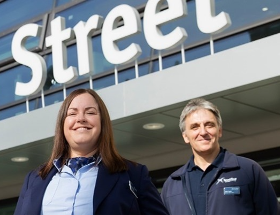Head Office: Atrium Court 50 Waterloo Street, Glasgow, G2 6HQ
Number of Staff: 5,000
1 Vacancies at ScotRail
FAQs
What are the benefits of working at ScotRail?
Free rail travel on all ScotRail services for you, your partner and children. Discounted travel on national and international rail services for you, your partner and children. Discounted ‘Friends and Family’ rail tickets for ScotRail services. Defined Pension Benefit Scheme from day one. Employee Assistance Programme, giving free and confidential advice to colleagues. Mental Health First Aiders. Discounted shopping on lots of high street stores and discounted tickets on days out. Access to the Transport Credit Union. Annual cycle to work discount scheme. One volunteering day a year, paid. Match funding for any charity fundraising. Generous annual leave allocation. Automatic entry to Healthshield, giving you money back on things like dental treatment and podiatry. Employee Recognition scheme for those going the extra mile
Ready to Apply?
Make sure you read the job advert carefully to give you a clear idea as to the knowledge, skills and ability we are looking for. Don’t assume we know anything about you. Decisions on who we invite for interview are based on the information shared in your online application form. Give specific examples of projects, activities and outcomes. Think about how your skills and experience relates to the job. Where you haven’t got specific experience, think about how you can demonstrate the same skills from different situations or sectors.
How to prepare for interview?
Interviews at ScotRail typically contain a mix of competence and values-based questions where we look for evidence of your experience and compare these against the ScotRail Values. This means that we'll require you to give specific, relevant, detailed and positive examples of things you've done during your career or from recent full-time education. Behavioral questions will tend to be ‘open questions' that will require you to give detailed answers. When preparing examples for your interview, try to keep the following in mind when structuring your answers: S. Situation – Describe the situation you found yourself in. T. Tasks – What tasks did you identify that needed to be done? A. Actions – What actions did you actually take? R. Results – What was the outcome? The key to these questions is ensuring that you have answered the question and have clearly articulated the scenario and have demonstrated what you personally did, said or achieved within the scenario. Preparation for your interview may seem like hard work – however, if you are fully prepared you will definitely feel more confident on the day and deliver a better performance. Think about your achievements and the details of what happened, what went well, the outcome and what you learned. Review your behaviours, looking at the criteria and behaviours required for the role. Try and think about what questions you may be asked and how you might respond to them. For some jobs there may be a 2nd interview stage and/or presentation. At this stage you may wish to study further by focusing on the key skills for the role and preparing more detailed examples of what actions you have taken in certain situations. Whether you are successful or not, you’ll be contacted (usually by email) to inform you of the decision.





